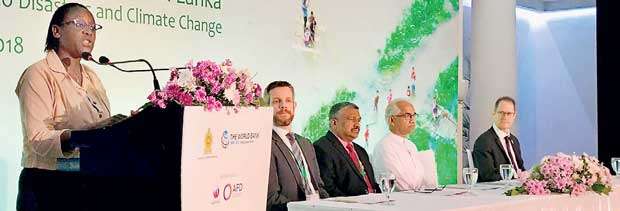26 Sep 2018 - {{hitsCtrl.values.hits}}

Dr. Idah Pswarayi-Riddihough addressing the conference
By Shabiya Ali Ahlam
Sri Lanka may be the envy of many countries in the region over its income and development bracket, according to the World Bank (WB), but concerns have become grave over its vulnerability to an array of disaster risks, which could eventually lead to the progress achieved thus far to be undone.
Acknowledging Sri Lanka has put in place extensive programmes to respond to disasters, World Bank Country Director Dr. Idah Pswarayi-Riddihough said more can be done by the government and development partners to coordinate these efforts and to ensure that disaster-affected households are supported until they fully recover.
With Sri Lanka being hit by natural disasters almost annually, the global lender estimates that 5.7 percent of the population is at risk of falling into poverty if a shock reduced their income by 20 percent.
It was pointed out that by taking lives, destroying assets and interrupting business activities, disasters are quite capable of adding measurably to the number of poor.
“This is where adaptive social protection can play a role. Adaptive social protection comprises a series of measures to protect the poor and the vulnerable from disasters. These measures make communities more resilient,” Pswarayi-Riddihough told a conference on ‘Adaptive Social Protection in Sri Lanka: Building Resilience to Disasters and Climate Change’ in Colombo yesterday.
It was stressed that adaptive social protection is not just about money, but it is also about social assistance and services, such as cash transfers, social insurance like pensions and disability benefits and active labour market programmes.
With support from the World Bank, Sri Lanka is said to be developing a social registry, which is a database containing details of citizens’ needs and conditions.
Currently in place are 35 programmes implemented by 11 ministries, each with its own rules and processes sans coordination. This is said to be reducing their impact and efficiency.
Pswarayi-Riddihough stressed that a social registry can help various programmes to determine ‘who needs help most’ in a systematic and objective manner.
While calling for the establishment of a ‘sophisticated’ social registry and welfare system to provide rapid assistance to disaster-affected citizens, the World Bank expressed its hope that Sri Lanka can, in the years to come, develop and implement a truly adaptive social protection system and lead the way, sharing experiences with other countries.
17 Nov 2024 39 minute ago
17 Nov 2024 3 hours ago
17 Nov 2024 3 hours ago
17 Nov 2024 6 hours ago
17 Nov 2024 6 hours ago